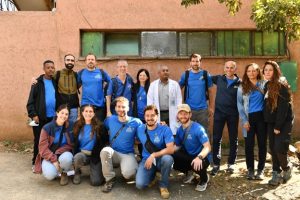
As is the case elsewhere in the world, the 1440th Eid-al adha festivity is being marked today by Ethiopian Muslims nationwide with the sentiment of sharing with the destitute and overriding love for one another.
Approached by The Ethiopian Herald Abdulkader Ibnu Amar the Eimmanee/leader/ at Huda Mosque near Mekanisa area here in Addis said the holiday is meant to show the omnipotence of Allah and the resonance of his message both on land and paradise.
Relating about what people should know about the holiday, he said Arafah is a festivity Muslims, imbued with a feeling of adoration, remember the Almighty— creator of all things. This celebration of the holiday is accentuated by the Haji pilgrimage, conducted irrespective of differences in race, language, color, and sex depending on the faithful’s financial capacity to cover costs.
He added that “We all Ethiopians should preserve the unity; love and freedom achieved by the almighty and pass them down to the next generation according to religious preaching that should be seen reflected in our lives.”
Charged with the feeling of humanity, the Muslim community should tolerate others regardless of their backgrounds— who they are and where they came from. Providing love and support for the have-nots during Eid Al-Adha festivity must be the overarching task of the Muslim faithful, he stated.
Sualah Amman, a prayer at Paisa Bennie Mosque, said Islam, is the origin of peace, unity, respect, cooperation and kindness. This is put in black and white on Islamic Holy Qur’an. The dos and do nots are got from the prophets and preachers.
He called on the Muslim community to give value for peace and advance development in keeping unity as the Holy Qur’an told.
Sualah, said that, the unity of the Muslim community is important for the good looks and prosperity of Ethiopia towards developing in all aspects.
Eid al-Adha is commemorating festivity of the willingness of Ibrahim (also known as Abraham) to follow Allah’s (God’s) command to sacrifice his son. Muslims around the world observe this event.
As the Holy Day usually begins with morning prayers, the celebrations continue with visits to friends and family, exchange of gifts and feasts. Those who can afford also slaughter an animal, like a cow or sheep, and share the meat with the people who have no families to support.
According to Sualah, since the day is also known as feast of sacrifice, the Muslim community is also required to donate to charities that cheer up the people in need around their residences. Muslims regularly exchange gifts during the holiday. Such gifts do not focus on family hood but for the poor community. They extend this generosity by visiting ill or sick people.
“Eid Mubarak (pronounced EED muh-BAR-ack) and Eid Saeed are repeatedly used greetings during the day to offer best wishes among the Islamic faithful,” he noted.
THE ETHIOPIAN HERALD SUNDAY EDITION 11 AUGUST 2019
BY MUSSA MUHAMMED





